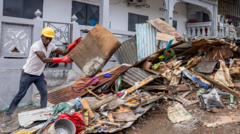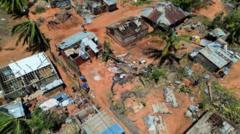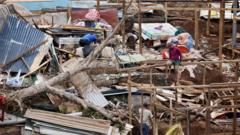The French government has instituted a national day of mourning in response to the devastation caused by Cyclone Chido in Mayotte, highlighting the ongoing struggles faced by survivors and the need for comprehensive aid.
France Declares Day of Mourning for Cyclone Chido Victims in Mayotte

France Declares Day of Mourning for Cyclone Chido Victims in Mayotte
National remembrance to honor lives lost as aid efforts face criticism and challenges
On December 14, Cyclone Chido struck Mayotte, a French territory in the Indian Ocean, resulting in catastrophic damage. The storm, which brought winds exceeding 260 km/h and intense rainfall, has been labeled the worst the islands have experienced in nearly a century. In the wake of destruction, French President Emmanuel Macron visited the stricken area, where he encountered local discontent regarding the speed of aid delivery.
As a mark of respect for those who lost their lives in the cyclone, which has resulted in at least 31 confirmed casualties and many more feared missing, France will observe a day of national mourning. Citizens in major cities including Paris, Marseille, and Lyon will participate in memorials, and flags will be flown at half-mast in a demonstration of solidarity.
Survivors continue to grapple with severe hardships in Mayotte, where basic necessities such as water, electricity, and communication are scarce. Over 100,000 residents have sought refuge in shelters operated by the Red Cross after severe destruction displaced them from their homes, often made of fragile materials.
Macron's visit was met with protests from locals demanding quicker and more substantial government assistance. Despite acknowledging the tragedy, he defended himself against their grievances, emphasizing that the cyclone was beyond anyone's control. Meanwhile, Prime Minister François Bayrou categorized the calamity as potentially the worst natural disaster in French history over the past several centuries.
As recovery efforts are initiated, Macron has committed to rebuilding the infrastructure and homes in Mayotte, underscoring the urgent need for support in this impoverished region. The cyclone's impact extended beyond Mayotte, claiming additional lives in Mozambique and Malawi, showcasing the widespread devastation caused by this extreme weather event.
As a mark of respect for those who lost their lives in the cyclone, which has resulted in at least 31 confirmed casualties and many more feared missing, France will observe a day of national mourning. Citizens in major cities including Paris, Marseille, and Lyon will participate in memorials, and flags will be flown at half-mast in a demonstration of solidarity.
Survivors continue to grapple with severe hardships in Mayotte, where basic necessities such as water, electricity, and communication are scarce. Over 100,000 residents have sought refuge in shelters operated by the Red Cross after severe destruction displaced them from their homes, often made of fragile materials.
Macron's visit was met with protests from locals demanding quicker and more substantial government assistance. Despite acknowledging the tragedy, he defended himself against their grievances, emphasizing that the cyclone was beyond anyone's control. Meanwhile, Prime Minister François Bayrou categorized the calamity as potentially the worst natural disaster in French history over the past several centuries.
As recovery efforts are initiated, Macron has committed to rebuilding the infrastructure and homes in Mayotte, underscoring the urgent need for support in this impoverished region. The cyclone's impact extended beyond Mayotte, claiming additional lives in Mozambique and Malawi, showcasing the widespread devastation caused by this extreme weather event.


















